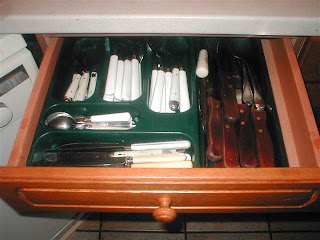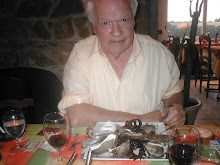
I have a bad back, the result of age, carrying too much weight, and years of bending over a computer, writing. It prevents me from standing for more than a couple of minutes without severe aching, or from walking more than a hundred yards without having to find somewhere to sit or prop. It increases my insomnia; sometimes I can't find a position to lie in without pain, and through the night it disturbs me into wakefulness. Queueing at airports can be a nightmare, especially when one is trailing with infinite slowness around the maze leading to security. I'm too proud, and not infirm enough, to ask for a wheelchair. Luckily it's okay when I'm sitting, which I do most of the day.
And there are a few consolations. I don't have to walk the dog. I get excused from carrying heavy items. And occasionally, if I'm going to a restaurant with Angela and friends, the walk from the car park can be made pleasant with attractive assistance. As in the photo.












